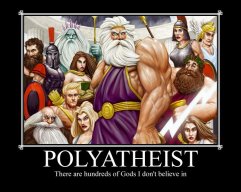 Outside of my formal academic work, I see myself as a cultural critic when I care enough to pay attention to anything outside of what I have immediately in front of me (which is generally too much). In particular, I see myself as a critic of much of contemporary Christianity, my own tradition. I’m interested in critically examining those elements of my religious heritage that many, if not most, would consider indispensible, essential, or fundamental; things without which, in other words, the faith would not be Christianity at all, but something different.
Outside of my formal academic work, I see myself as a cultural critic when I care enough to pay attention to anything outside of what I have immediately in front of me (which is generally too much). In particular, I see myself as a critic of much of contemporary Christianity, my own tradition. I’m interested in critically examining those elements of my religious heritage that many, if not most, would consider indispensible, essential, or fundamental; things without which, in other words, the faith would not be Christianity at all, but something different.
I know that, in the past, I have started several “series” on this site and never finished them. It’s been a year since I really blogged on anything. So I’m not going to say that this is a “series” of anything, but maybe a refocusing of the kinds of topics I like to think about, but with a sharper, more critical edge, an edge that I use when I teach my religious courses. Thus while my academic work mostly concentrates on antiquity, I want to apply some of what I do to stuff in my faith tradition that just Drive. Me. Nuts.
This will require a lot of blending of theory and method with the “stuff.” So, in this first post, let’s get some of that out of the way.
Some basic things that I assume: Stuff doesn’t just exist. Societies, human relationships, social and cultural artifacts, and religions are created things, products of languages, practices, and habits, of social and historical conditions in relationship to powers and authorities. The world we live in does not exist as something “natural.” When I look at certain elements of a religion, I generally start from this point, and I ask “what social and historical conditions allowed this to come into existence?” “How is this similar or different from the way this idea or element was presented in the past?” “Whose interests are served by this element and by the way it is presented?”
Take the Bible, for instance, which is, outside of the figure of Jesus, the single most powerful icon in Christianity. The sight of a Bible will trigger in most Christians a stimulus response that is at first biological and electrical that sends signals to the brain that identifies a book as a Bible. But those bioelectric signals are then interpreted by many Christians to signal not just a book, but “sacred book.” I am less interested in whether the Bible is, by some internal, eternal virtue “sacred”, and much more interested in questions like “how and why was it written?” “Who wrote the different parts of it?” “What social and historical circumstances caused the writers to interpret their reality in such a way that they wrote these texts?” “What social and historical circumstances have required some groups to apprehend this text as authoritative, and why?” “Whose interests are served by understanding the Bible this way?”
Another point here: “Critical” does not mean “tear down” or “attack” something. Instead, I use the word “critic” and “critical” in its academic sense, which is simply to seriously check out what is taken for granted (myself included). Sometimes (oftentimes, for religious people) the results can be unflattering or downright destructive to long-cherished notions. No doubt about it. Nevertheless, I have found that this kind of analysis can be liberating and exhilarating and open up new doors for understanding and practicing faith that can inject some much needed life into a faith tradition. (It goes without saying that there is also the risk that successful criticism will drive people away from faith; an unfortunate risk, but one that is unavoidable. It might be thought of as analogous to major surgery. “If you don’t have this surgery, you will have major problems later in your life. But if you decide to do it, it could also kill you.”)
With those preliminaries out of the way, then, we can get right to it. Perhaps the blog might pick up the readership again. In the next post, whenever that is, I’ll take up the subject of “religion” generally, like I do in my classes. What is it? Can we define it? Is there some “essence” that all religions have?



 “Theos” is a crappy translation for yhwh or elohim. Thanks a lot, Septuagint.
“Theos” is a crappy translation for yhwh or elohim. Thanks a lot, Septuagint.